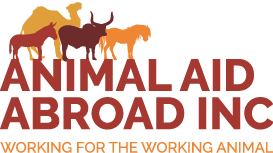SAWS working on the big picture, not just the day to day cases
Somaliland's Social & Animal Welfare Service (SAWS) has sent us their January review of activities:
"SAWS mobile vet clinic with the support of AAA is continued as usual, the activity of January started with a new MOU between Animal Aid Aboard and SAWS with the aim to implement good quality work to make sure the present and future welfare of animals over Hargeisa and surrounding areas in the country of Somaliland. To achieve this mission, SAWS, with the partnership of Animal Aid Abroad dedicated:
*To provide free vet services through mobile clinic to alleviate suffering for working donkey
*Raise awareness of animal owners/users with regard to better management for donkey welfare
Mobile vet clinics on field visits to the working animals in their working environment and to more remote locations where reported for working donkeys needing help. The clinic team has conducted periodic health checks and basic care for working donkeys in sub-sections of Hargeisa city. A total of 135 donkeys were treated in the month of January and two professional Vet Doctors were involved in the clinic operations.
Much of the clinic work is done in the animals’ work places. This allows our vets to educate a large number of owners and users in the basics of animal welfare and in the great importance of early treatment of diseases. In general, wounds from poor harnesses, skin diseases, worms, internal parasites, external parasites, malnutrition and laments are the prominent treated cases.
SAWS has a close working relationship with the Ministry of Livestock and the Ministry attached Vet doctors to our Vet clinic after the Ministry recognized the importance of treating working animals or donkeys that are forgotten or neglected by their owners.
In the animal owning communities, young people are driving the donkeys, and do not provide adequate care for these animals. Tomorrow they may be the owners, so there is a need to build a young generation that understands the need for the welfare of working animals. Humane education sessions for young people who are working with donkeys is required to change their attitude with regard to animals and educate them how to provide proper care.
Inappropriate and poor harness design is the main cause of chronic sores and wounds on working donkeys. As we revealed, some cases of these sores become so severe that they require further surgical intervention. Proper training is important to halt harnessing problems.
Most of the working donkey owners/users are very poor and so have the greatest difficulty in feeding and maintaining their families. Their animals are their only means of livelihood and when these become old, lame or involved in an accident, most owners simply cannot afford to care for their animal and they are abandoned. Another issue is that when a donkey becomes old, their teeth condition is poor, which makes it difficult for the donkey to chew their food, and owners abandon the aged donkey and it dies on streets."










